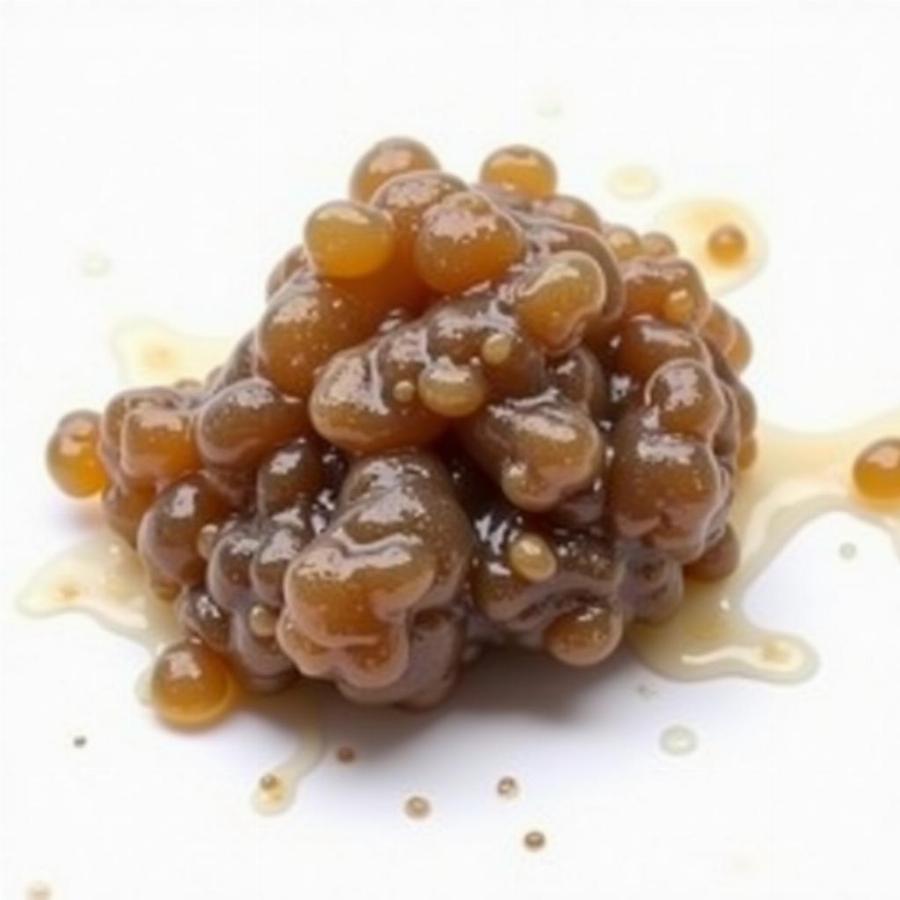Diarrhea with mucus in dogs can be alarming for any pet owner. This article will delve into the common causes of this issue, discuss effective treatment options, and help you understand when it’s time to seek immediate veterinary attention. Understanding what mucus in your dog’s stool could mean is crucial for their health and well-being.
Understanding Mucus in Dog Stool
Mucus in a dog’s stool can sometimes be normal, particularly in small amounts. However, large amounts of mucus, especially combined with diarrhea, can signal a problem. The mucus itself is produced by the intestines to lubricate the digestive tract and protect it from irritants. An increase in mucus production often indicates inflammation or irritation in the gut.
What Does the Mucus Look Like?
The mucus may appear as a clear, jelly-like substance coating the stool or mixed within it. It can also be whitish or yellowish in color.
 Mucus in Dog Stool
Mucus in Dog Stool
Why Does My Dog Have Diarrhea with Mucus?
Several factors can contribute to diarrhea with mucus in dogs, ranging from dietary indiscretions to more serious medical conditions.
Common Causes of Diarrhea with Mucus in Dogs
- Dietary Indiscretion: Eating something they shouldn’t, like garbage, spoiled food, or table scraps, can upset their digestive system.
- Stress: Changes in routine, travel, or even loud noises can trigger stress-induced colitis, leading to mucus in the stool.
- Food Allergies or Intolerances: Certain ingredients in dog food can cause an allergic reaction or intolerance, resulting in digestive upset.
- Parasites: Intestinal parasites like roundworms, hookworms, whipworms, and Giardia can cause inflammation and mucus production.
- Bacterial or Viral Infections: Infections like parvovirus, salmonella, or E. coli can cause severe diarrhea often accompanied by mucus.
- Inflammatory Bowel Disease (IBD): IBD is a chronic condition characterized by inflammation in the digestive tract, often resulting in persistent diarrhea with mucus.
Treatment for Diarrhea with Mucus in Dogs
Treatment will depend on the underlying cause. Mild cases of dietary indiscretion might resolve with a bland diet and plenty of water. However, more serious causes like infections or IBD will require veterinary intervention.
Home Care for Mild Cases
- Bland Diet: Offer small, frequent meals of boiled chicken and rice or a commercially available bland diet.
- Hydration: Ensure your dog has access to fresh water at all times to prevent dehydration.
- Probiotics: Probiotics can help restore the balance of healthy bacteria in the gut. can dogs catch c diff from humans
- Rest: Encourage rest and avoid strenuous activity.
Veterinary Treatment
Your veterinarian may recommend:
- Fecal Examination: To check for parasites.
- Blood Tests: To assess overall health and identify any underlying infections.
- Medications: Antibiotics, anti-parasitics, or anti-inflammatory medications depending on the diagnosis. robitussin dosage for dogs
When to Worry
Seek immediate veterinary attention if your dog:
- Has bloody diarrhea. my dog has jelly-like diarrhea
- Is vomiting.
- Is lethargic or unresponsive.
- Shows signs of dehydration (dry gums, sunken eyes).
- Has a fever.
- Has lost weight.
Conclusion
Diarrhea with mucus in dogs can have various causes, some minor and others requiring prompt veterinary care. By observing your dog’s symptoms, providing supportive care at home when appropriate, and seeking professional help when necessary, you can help your furry friend get back to their happy, healthy self. Remember that accurate diagnosis and treatment are crucial for resolving this issue and ensuring your dog’s well-being. do dogs have a gallbladder
FAQ
- Is a little mucus in dog stool normal? Yes, small amounts can be normal, but large quantities are often a sign of a problem.
- Can stress cause mucus in dog stool? Yes, stress-induced colitis can lead to mucus and diarrhea.
- What should I feed my dog with diarrhea and mucus? A bland diet of boiled chicken and rice is often recommended.
- When should I take my dog to the vet for diarrhea with mucus? If the diarrhea is severe, bloody, or accompanied by other symptoms like vomiting, lethargy, or dehydration.
- What are some common parasites that can cause mucus in dog stool? Roundworms, hookworms, whipworms, and Giardia.